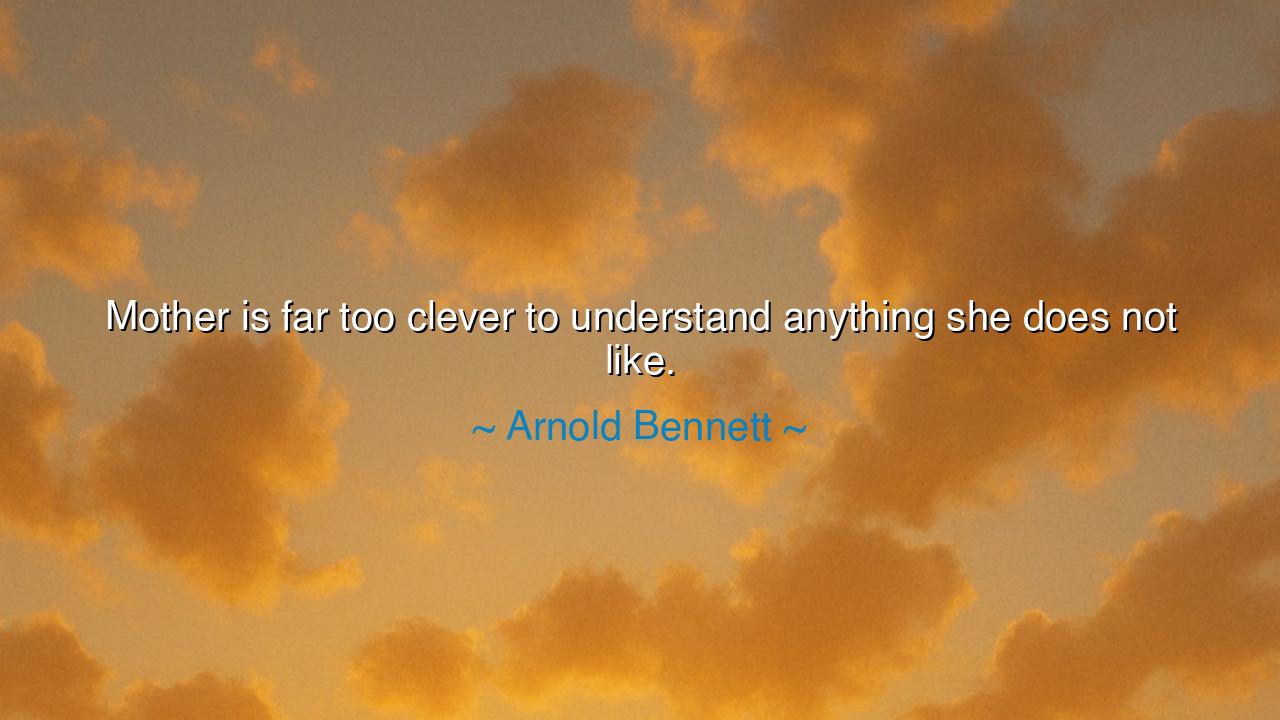
Mother is far too clever to understand anything she does not






Hearken, O seekers of insight, to the wry yet piercing wisdom of Arnold Bennett: “Mother is far too clever to understand anything she does not like.” In this seemingly playful remark lies a truth that runs deep within the human condition — a reflection on selective perception, the quiet power of love, and the instinctive will to preserve harmony in the heart. Bennett, with the wit of an observer and the soul of a philosopher, speaks not merely of ignorance, but of a mother’s wisdom — that rare ability to unsee what would wound her love, to silence what would disturb her peace.
In every age, the mother’s understanding has been shaped not only by intellect but by emotion. She does not analyze love; she protects it. Her cleverness is not the cleverness of reason alone, but of intuition, born from years of nurturing, worrying, forgiving, and enduring. When she chooses not to “understand” something she dislikes, she is often shielding herself from pain — or protecting her child from the full weight of her judgment. In that restraint, there is mercy. In that silence, wisdom. For the heart that loves deeply learns that not all truths need to be spoken, nor all errors magnified.
Consider, for example, the story of Mary Wollstonecraft Shelley, author of Frankenstein, and her mother, the philosopher Mary Wollstonecraft, who died giving her life. Though the elder Mary was gone, the daughter lived under her legacy — admired, criticized, and compared. Shelley, who lived boldly, often defied the moral codes of her time. Yet her stepmother, though often strict, was known to turn a blind eye to certain youthful rebellions, choosing peace over confrontation. She embodied that same selective wisdom Bennett describes — understanding just enough to love, but not so much as to condemn.
This, then, is the paradox at the heart of Bennett’s saying: the mother’s ignorance is not a flaw of intellect, but a gift of love. It is the deliberate blindness that comes from deep understanding — the refusal to dissect the soul of one she cherishes. Just as the sun does not count the shadows it casts, the mother does not tally every fault of her child. She “does not understand” what she disapproves of, not because she cannot, but because she will not let disapproval destroy affection. It is an art both divine and human — the art of mercy disguised as naiveté.
The ancients knew of such wisdom. In the courts of Rome, mothers often interceded for their sons condemned by law, pleading not out of ignorance of their crimes, but out of a greater knowledge — the knowledge that a soul can err and still be redeemable. Likewise, the mothers of poets, revolutionaries, and dreamers have always understood this delicate balance: to love fiercely while forgiving quietly, to guide without condemning. Such cleverness of the heart is far more powerful than the sharpest intellect.
From this reflection arises a lesson both gentle and profound: there are times when love must temper truth, when mercy must veil judgment. To “not understand” what one dislikes is not always weakness; it may be wisdom in disguise — the recognition that understanding everything can sometimes break what should be mended. The mother’s love teaches us the discipline of restraint, the sanctity of patience, and the virtue of forgiveness.
Practical guidance flows from this insight: in your own dealings — whether with family, friend, or foe — learn to practice compassionate ignorance. See the good before the flaw; allow love to soften knowledge. When a fault is small and forgiveness possible, let your heart, like that of the mother, “not understand” too much. In this, you will preserve not only peace with others but peace within yourself.
And so, let Bennett’s saying echo as timeless wisdom: true cleverness lies not in knowing all things, but in knowing when not to know. The mother who chooses love over judgment, silence over reproach, is not blind — she is wise. Her seeming ignorance is divine restraint, her mercy the highest form of intelligence. For in every act of such grace, the world is softened, and the eternal bond between love and understanding is renewed once more.






AAdministratorAdministrator
Welcome, honored guests. Please leave a comment, we will respond soon